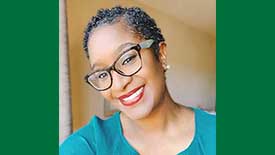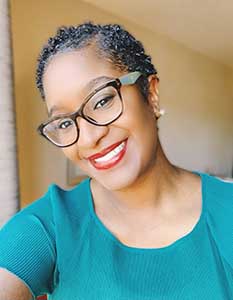Brenda Tindal ’04 addresses why ‘We Can’t Breathe’

Neither my eyes nor ears can escape the sight and sound of George Floyd’s fatal encounter with Minneapolis policemen on May 25, 2020. I will spare you the specifics here — not because the details are unimportant, but because the 8 minutes and 46 seconds that drained the life from Mr. Floyd is an all too familiar trauma. His dying word s— “I can’t breathe” — signifies a tragic American narrative and ushers yet another black man into a fraternity no one wishes to pledge.
George Floyd’s death is made even more irreconcilable amid the recent spree of racially charged violence and excessive force cases that stole the lives of Ahmaud Arbery, Breonna Taylor, Rayshard Brooks and others. These acts of violence are compounded by a looming coronavirus (COVID-19) pandemic. COVID-19 has proven to be an unpredictable and indiscriminating pathogen that has ravished millions globally and spawned a “sick and shut-in” reality across American society. For African Americans, in particular, the virus has disproportionately led to mortality—bringing the labyrinth of race, poverty and health disparities into sharper focus.
Some may argue that death is part of the universal cycle of life, but the spectacle and repetition of black suffering and duress is anything but normal. It is inhumane. So, what is my point? Why is it important to discuss enactments of civilian-police violence in tandem with the pandemic? And how do these seemingly disparate topics relate to civil unrest in the 21st century?
Perhaps, the simplest response is that racism, like the coronavirus, is the greatest threat to our social, political, economic and spiritual wellness. They are wreaking havoc on our bodies and body politic — one for centuries, the other for months. In short, we have to break the momentum of both pathogens. This is not a public service announcement; it is a public health crisis.
As thousands trade “social distancing” for social protest, the unrelenting arithmetic of a roving pandemic and spasms of racialized violence has thrust the world into a resounding dry heave: “[We]…Can’t…Breathe.” This is the battle cry of an indignant generation.
Like many, I watched in awe as the verve of protest spread from the town square of Minneapolis, to the palatial urbanity of Paris, France, into the center city of my hometown, Charlotte, North Carolina, and to nearly every major city in the world. Admittedly, I was also gripped by a combination of frustration and anxiety as media coverage of civil disobedience gave way to the pandemonium of alleged “rioting,” “arson” and “looting.” To be clear, I cringe as the country stands in judgment and condemnation — debating the legitimacy of this generation’s rage. Much of this discourse pits the “riots are the language of the unheard” camp against the “why would you tear up your own community?” faction [1]. I’m certain that Dr. Martin Luther King, Jr. — one of our great champions of civil and human rights — never intended for his wisdom to be leveraged as mere “talk” without the “walk.” Moreover, in this ring of lip boxing, where is our consideration and empathy for a generation so hungry for justice and human dignity that they’d risk their own health and wellness to “take to the streets” amid a pandemic? And to push this observation further, what are the emotional, mental and physical consequences of living in a society in which the most pedestrian activities — jogging, sleeping, reading, listening to music, bird watching in the park, an errand to the grocery store, waiting in line at a fast food drive thru, or sitting in the comfort of your own home — could culminate with injury or death? This hostile calculus between life and death is a daily ritual for black Americans.
In truth, a war of words coupled with inaction is counterproductive in this age of unbridled racial animus and deepening polarization. In my view, it is imperative that we shift our respectability politics and line of inquiry from HOW people protest to WHY they do so. While the answers to the latter are a callus on the soul of this republic, we can no longer afford to ignore the root causes inured to this gauntlet of human suffering and widespread social unrest.
Without a doubt, the fervor of this hour should inspire dialogue and courageous inquiry about the history and virtues of civil unrest. But it also requires creative solutions and a radical re-imagining of how policy, coalition building, community and national leadership and social reform work can dismantle the pathology of structural racism and its interconnected systems of oppression and violence. The clarion call for an anti-racist community of practice and sustainable systems change can only be achieved when “Justice is a verb” [2].
George Floyd’s life mattered. Frankly, he shouldn’t be the latest cause célèbre of this contemporary human rights movement; he should be the last. We owe him and this indignant generation more than a litany of eulogies and #hashtag memorials. We owe them and ourselves, the satisfaction of more justice and more peace. But, in the meantime, “[We]…Can’t..Breathe.”
 Brenda Tindal ’04 is an awarding-winning educator, public historian, and museum practitioner. As Director of Education & Engagement at the International African American Museum in Charleston, South Carolina, Tindal provides organizational leadership in the areas of community engagement, K-16 educational initiatives, exhibit content and curriculum development, public programming, global strategic partnerships, and the overarching museum visitor experience.
Brenda Tindal ’04 is an awarding-winning educator, public historian, and museum practitioner. As Director of Education & Engagement at the International African American Museum in Charleston, South Carolina, Tindal provides organizational leadership in the areas of community engagement, K-16 educational initiatives, exhibit content and curriculum development, public programming, global strategic partnerships, and the overarching museum visitor experience.
Tindal previously served as the staff historian and senior vice president of Research and Collections at the Levine Museum of the New South, where she co-curated the “K(NO)W Justice, K(NO)W Peace” (KJKP) exhibit following the 2016 officer-involved fatality of Keith Lamont Scott in Charlotte. KJKP is considered one of the first rapid-response exhibitions to provide a socio-historical survey of local and national community and police relations in the United States.
Recipient of numerous awards and accolades, including a 2011 Institute of Museum and Library Service (IMLS) fellowship at Princeton University and the 2019 Charleston Freedom Schools “Community Partner of the Year,” Tindal is a proud alumna of UNC Charlotte (2004) and Emory University (2010). She currently resides in Charleston, South Carolina.
[1] This now famous quote is drawn from Dr. Martin Luther King, Jr.’s “The Other America” public address on March 14, 1968, at Grosse Pointe High School (near Detroit, Michigan). This important speech was delivered almost two weeks before his untimely assassination on April 4, 1968.
[2] Bakari Sellers used this phrase during a CNN interview on May 30, 2020, regarding the outbreak of protest in response to the officer-involved fatality of George Floyd